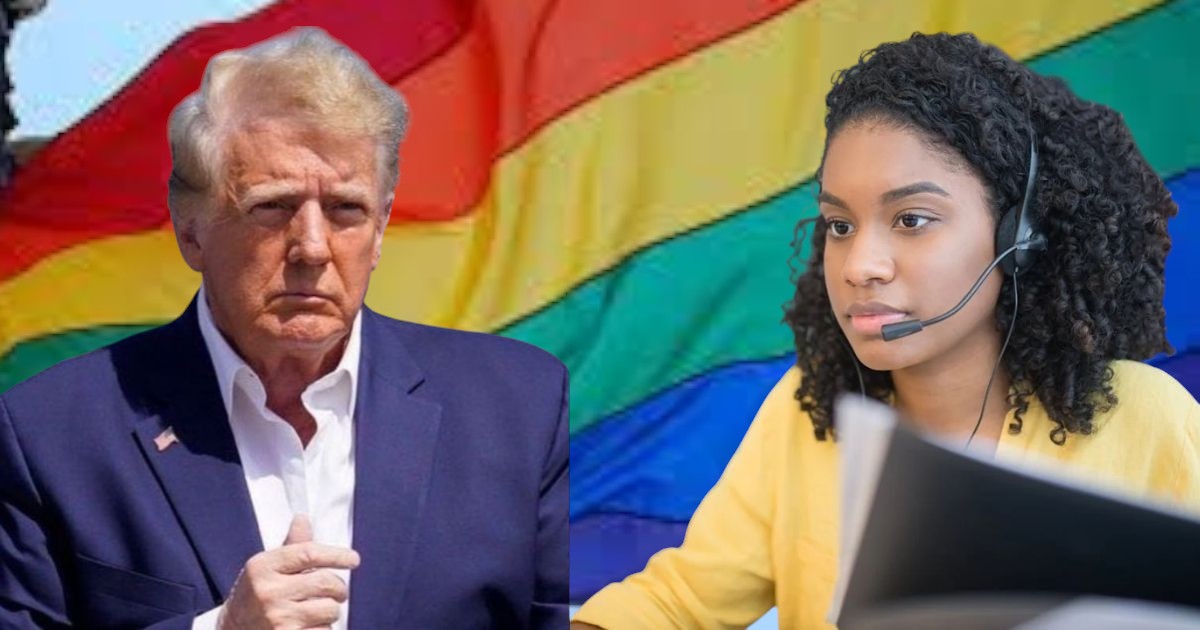Donald Trump and his administration have waged a war against LGBTQ+ youth. The administration had made its intentions clear long before it came into power and has been on the path to implementing each one of the “promises” mentioned in Project 2025.
Under this administration, the Department of Health and Human Services has proposed a 2026 budget. It includes one of the most controversial moves. The budget proposed to eliminate the funding for LGBTQ+-specific counseling services.
These services are provided by the National Suicide Hotline, known as 988. However, the funding for the general hotline is still set to receive $520 million in continued funding.
The budget shifts focus away from specialized support tailored to high-risk groups, especially LGBTQ+ youth.
Currently, the 988 Lifeline offers an LGBTQ+ subnetwork. It has been developed in partnership with organizations like The Trevor Project. This network provides identity-affirming crisis support that is culturally sensitive and competent.
Among the most vulnerable communities, LGBTQ+ people come to the top and have the highest risk of mental health emergencies. If the proposed budget is passed then the subnetwork will be dismantled by October 2025 and all the vital resources for some of the country’s most vulnerable youth will be cut.
The 988 hotline was relaunched in 2020 once the Joe Biden administration took over. It became a crucial part of national Mental health infrastructure.
The FCC has voted unanimously to move forward in designating 988 as a new, nationwide, 3-digit number for a suicide prevention and mental health crisis hotline.
Here’s @AjitPaiFCC’s reaction ⬇️#FCCLive pic.twitter.com/IMf0iUECmT
— Tina Pelkey (@TinaPelkeyDC) December 12, 2019
It has received more than 1.2 million contacts from LGBTQ+ individuals in crisis. These calls reflect a lifesaving service for a population that faces harassment, discrimination, and high mental health risks. There have been studies have shown that LGBTQ+ youth are over four times more likely to attempt suicide than their non-LGBT+ peers.
This reality was a driving factor behind federal mandates. These mandates required specially trained staff and LGBTQ+-focused partner organizations. Eliminating this framework will reverse hard-won progress. It will also send a dangerous message that the lives of these youth and groups do not matter.
Trump/Vance want us dead.
NBC NEWS: White House proposes axing 988 suicide hotline services for LGBTQ youthhttps://t.co/cD8wVXIlds
— That Gay Guy Candle Co. (@gayguycandleco) June 10, 2025
A senior official within the Trump administration defended the proposal and framed it as a necessary step to stop funds from reaching “radical grooming contractors.” This language feeds into long-debunked and harmful stereotypes that somehow correlate LGBTQ+ support with inappropriate behavior. This rhetoric is more than just offensive. It actively puts the lives of youth struggling in their conservation and non-accepting communities.
Mental health professionals and civil rights organizations have condemned the move. They argue that removing specialized counseling would take away a layer of safety that many LGBTQ+ youth rely on in moments of crisis.
ZAYN has signed an open letter to the LGBTQ+ community : “We will not stop fighting for you”
The Trevor Project is the leading suicide prevention and crisis intervention nonprofit organization for LGBTQ+ young people.
🔗https://t.co/FT2HFCJYMO pic.twitter.com/7Rb1hmmUQU
— L&Z updates (@updatingziam) June 7, 2025
Jaymes Black, CEO of The Trevor Project, has also voiced strong opposition to the funding cuts. He has called the proposal “deeply upsetting.” “Every young life matters,” he stated, urging Congress to reject the proposal and preserve inclusive crisis support.
The timing of the announcement has sparked additional backlash. The announcement was made during Pride Month. It is a time meant to celebrate and uplift LGBTQ+ communities however these proposed cuts are in direct contrast to the spirit of inclusion and recognition.
These proposed budget cuts are more than just numbers on a page. They represent a critical point in the fight for equitable, accessible mental health care.













